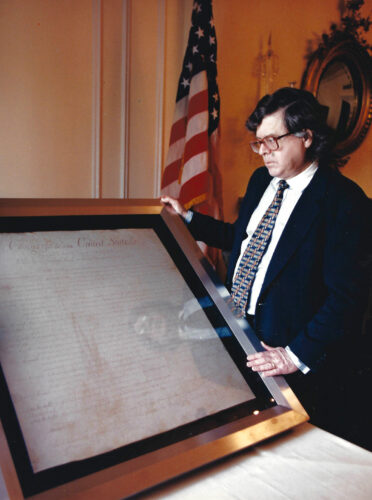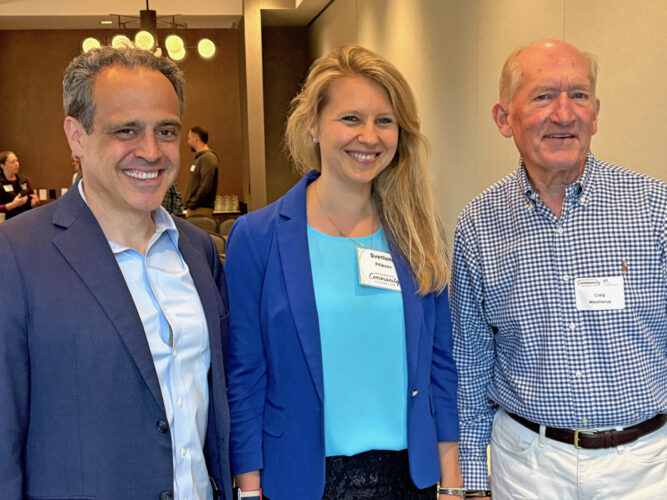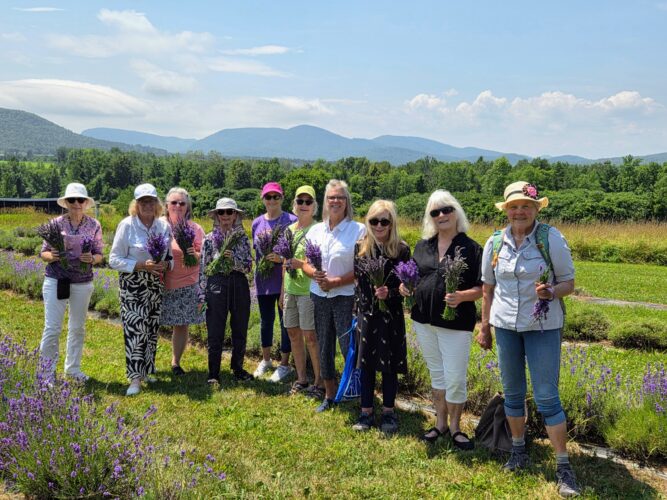ON THE SCENE: American arts funding made harder
- Geoff Neu and Cathy Johnston (Provided photo — Naj Wikoff)
- Juan Souki, executive director of the Mid Atlantic Arts, and James Lemons, executive director of the Lake Placid Center for the Arts (Provided photo — Naj Wikoff)
- Strand Center for the Arts staffers: Sommerleigh D’Elia, community engagement manager; Megan Charland, executive director; and Jamie Durivage, theater manager (Provided photo — Naj Wikoff)
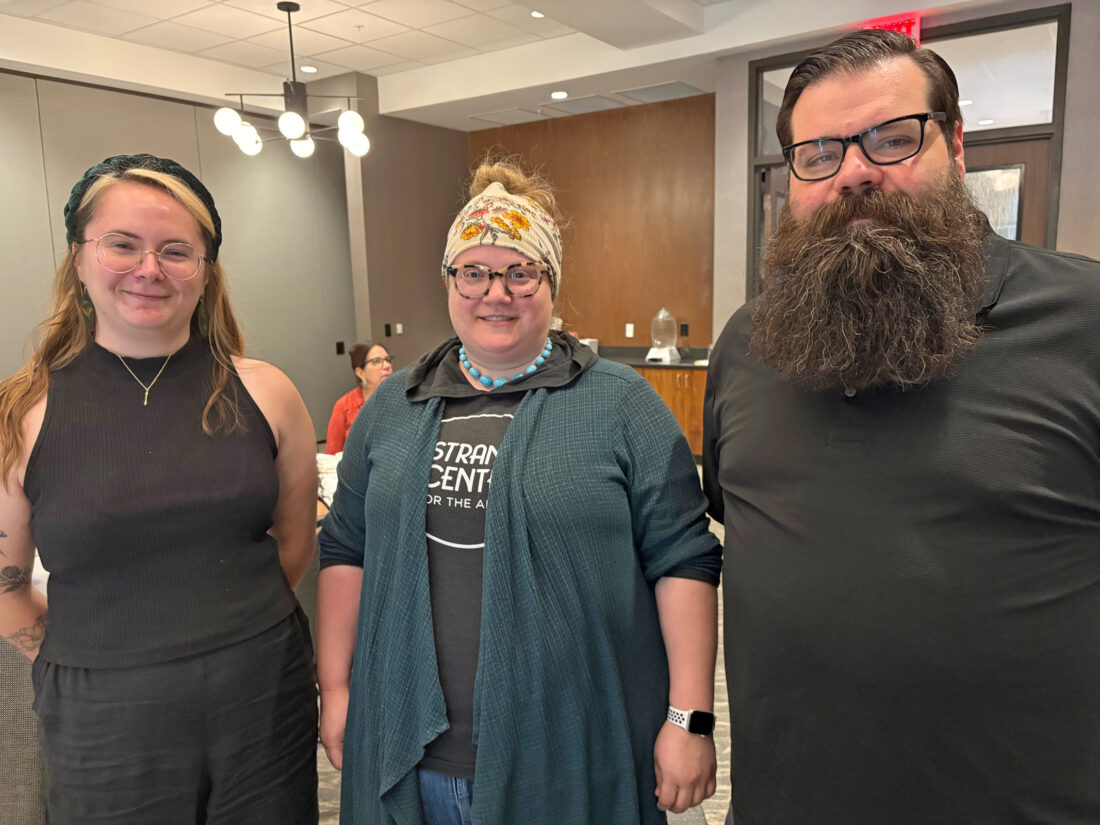
Strand Center for the Arts staffers: Sommerleigh D’Elia, community engagement manager; Megan Charland, executive director; and Jamie Durivage, theater manager (Provided photo — Naj Wikoff)
Federal funding for the arts, humanities, and museums is at risk. If proposed cuts and guidelines are approved, they will reflect significant funding and policy changes, according to Juan Souki, executive director, Mid Atlantic Arts.
Souki spoke Saturday morning, Aug. 9, to a small but concerned gathering of artists, arts agency leaders, and patrons of the arts at the closing Lake Placid Institute Adirondack Roundtable.
Already, the Trump administration proposed and Congress passed a law to zero fund the Corporation for Public Broadcasting, which allocates federal funding to public radio and television stations, and requires them to give back two years of funding already allocated. NCPR took a $670,000 hit, and Mountain Lake PBS approximately $1.9 million, cuts that have especially hit rural stations hard across the country.
For the National Arts and Humanities Endowments in 2026, the administration advocated zero funding, the House budgeted $135 million, and the Senate $207 million, the same as allocated for 2025. Overall, there has been historic strong bipartisan support for the arts, and intense advocacy led by the Americans for the Arts Action Fund has been critical for the Endowments getting this far. Yet, the outcome remains to be seen.
In January 2021, President Biden signed an executive order promoting racial equity, DEI (diversity, equity, and inclusion) if you will, which resulted in significant updating of all federal guidelines and increased private sector investment. However, on Jan. 21, President Trump signed an executive order that rolled back DEI initiatives. As a consequence, the National Endowment for the Arts notified recently awarded grantees that they no longer fund programs that include or can be construed to include DEI priorities; they then canceled thousands of grants.
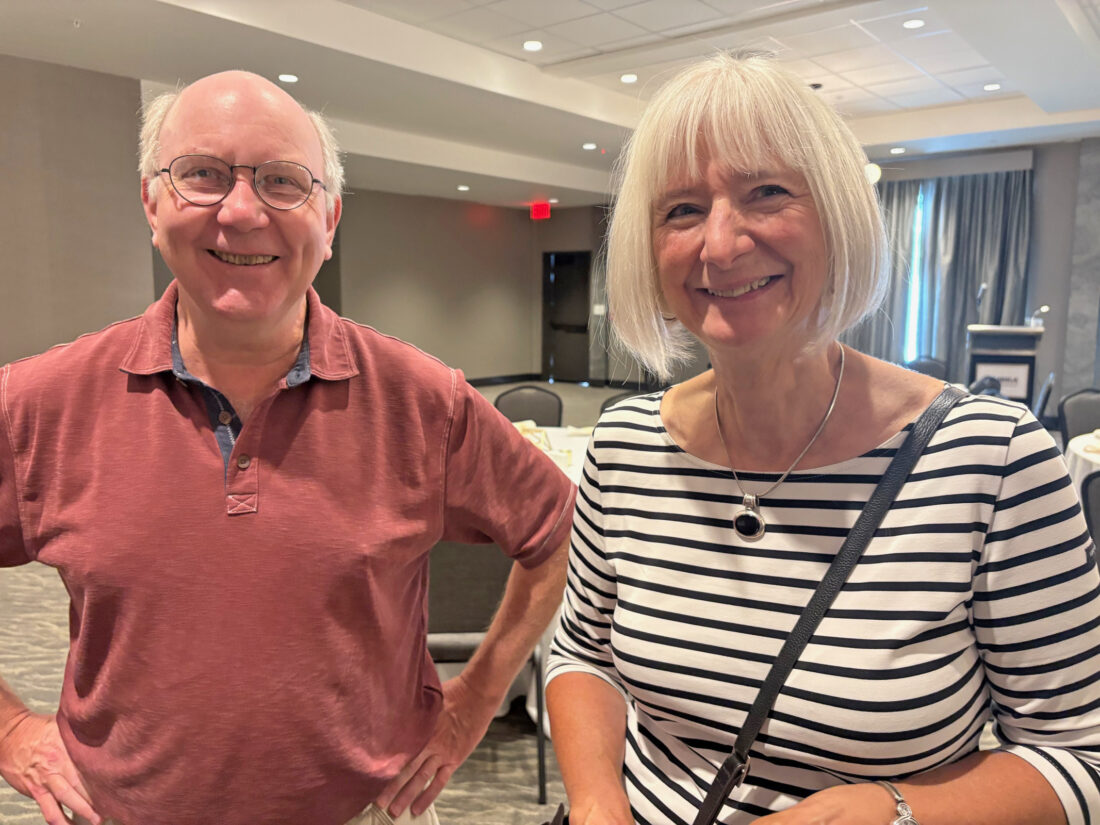
Geoff Neu and Cathy Johnston (Provided photo — Naj Wikoff)
A few months later, Department of Government Efficiency representatives gained access to the National Endowment for the Humanities computers and, on April 3, sent thousands of letters to grantees without notifying the NEH staff. DOGE informed the grantees that their funding had been canceled, and then terminated over half of the NEH’s staff.
“The result was chaos across the country,” said Souki.
A local agency that lost its NEH grant is OurStoryBridge, which has established a method of collecting 3- to 5-minute oral history stories and photographs from area residents and posting them on websites, usually in partnership with libraries. Launched at the Keene Valley Library, the program has been taken up by an increasing array of nonprofits across the county.
“OurStoryBridge has not only lost funding from the NEH, but also the Institute of Museum and Library Services; two separate federal agencies,” said Jery Huntley, founder and director. “We lost about $50,000, a huge loss for such a small organization. Once you start getting grants from the NEH and IMLS, you get increased funding from foundations, individuals, and other sources. So, what we lost was our future beyond the specific grants that were terminated.”
During this period of upheaval, the NEA lost funding, was forced to cut staff, and shift its funding priorities. The Institute of Museum and Library Services lost all its funding, an agency that has provided critical support to Fort Ticonderoga and Adirondack Experience, among others. Mid Atlantic Arts and the Lake Placid Center for the Arts experienced three significant program cuts: USArtists International, Performing Arts Global Exchange and ArtsHERE. Currently, a federal judge has deemed the administration’s cuts illegal, as their budgets had received congressional approval; however, the outcome of this order is uncertain due to ongoing contestation.
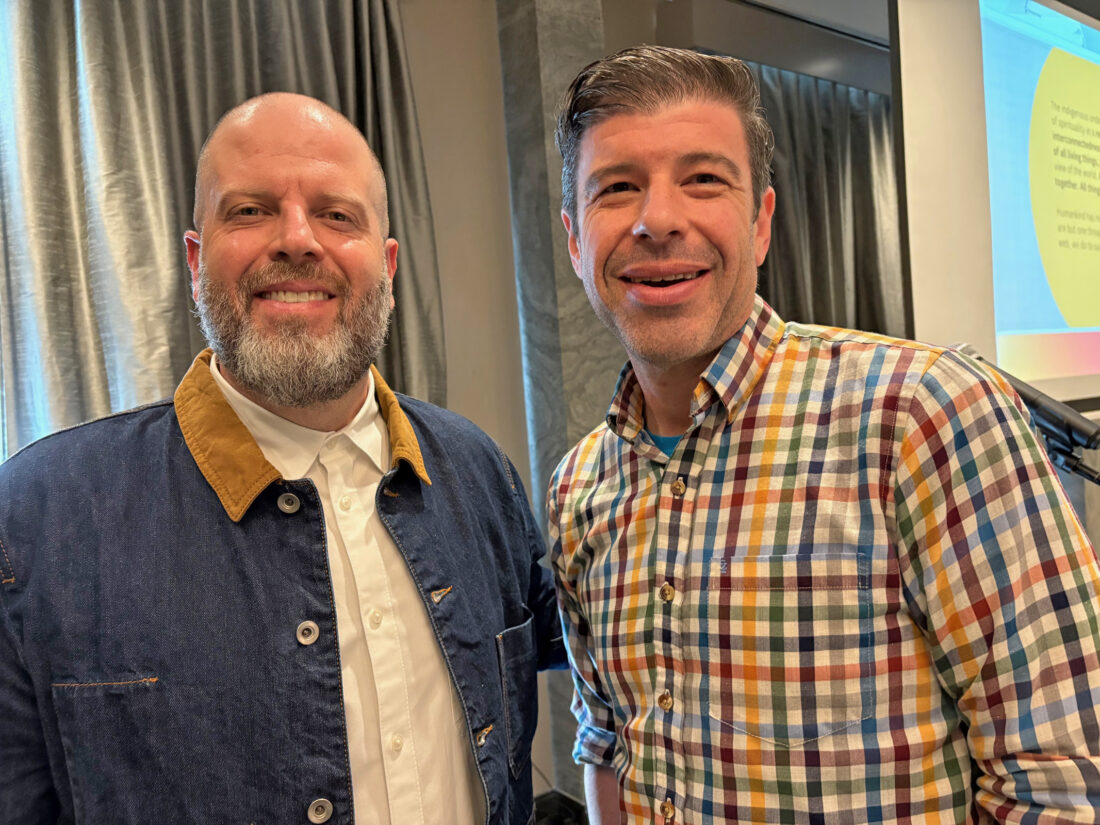
Juan Souki, executive director of the Mid Atlantic Arts, and James Lemons, executive director of the Lake Placid Center for the Arts (Provided photo — Naj Wikoff)
What is certain is that agencies like Mid Atlantic Arts are seeking to claw back as much cut funding as they can, and are working to educate the communities they serve on how to attempt the same and move forward within the new federal guidelines. They are also developing strategic plans to help the arts thrive in these uncertain times.
Throughout his life, Souki has been active in connecting and promoting community-based performing artists, especially those highly talented but not broadly known. Souki believes these artists and arts agencies are vital to community life, as are the East Branch Friends of the Arts, Lake Placid Sinfonietta, Pendragon Theatre, Recovery Lounge and the bulk of the LPCA programming and John Brown Lives arts events to our region. Souki’s goal is to make sure they thrive.
The NEA’s new priorities (May 2, 2025) include celebrating the 250th anniversary of the American independence, making America healthy again, making DC safe and beautiful, fostering skilled trades, assisting in disaster recovery, supporting the military and veterans, and empowering houses of worship to serve communities, a far cry from its founding priorities of encouraging progress in the arts, supporting artists and arts organizations, and providing Americans opportunities to participate in and experience the arts.
Souki said his staff is feeling frustrated as they are unable to provide clarity about the current changes and challenges, yet, through hard work, have managed to claw back over half the funding they have lost. While New York has the best-funded state arts council in the nation, doubling its budget would not suffice to cover the loss of federal funding for the arts, humanities, museums and public media, compounded by increasing costs as tariffs affect a broad spectrum of goods.
LPCA Executive Director James Lemons asked Souki what we can do.
“Advocate for the arts on all levels,” said Souki. “Try to avoid being divisive. Don’t fall into the trap of saying, if you don’t care for me, I’m not going to care for you. Be kind. Don’t stop believing in art as a bridge for bringing all kinds of people together. Every step we take in furthering the divisions that exist is a mistake. Do not compromise your ethics or soul in the process.”
He urged us to look for opportunities where the arts can intersect with the actual needs of our community and support the community through this moment, working with agencies and people that share our values.
“I felt Juan’s presentation on the status of arts funding and the hurdles we’ve got to face and overcome was very informative,” said Jamie Durivage, theater manager of the Strand Center for the Arts in Plattsburgh.
“Juan was wonderful,” said Cathy Johnston. “He was to the point, gave us facts and context in a kind way that helped us understand both sides, and what we have to do. I think there is hope for the arts, that there’s always hope.”
“I thought Juan’s presentation was very thought-provoking and, despite all the chaos in front of us, there is a strong element of hope,” said Geoff Neu. “Juan was upbeat in the face of a downbeat topic.”
(Naj Wikoff lives in Keene Valley and has been writing his column for the Lake Placid News since 2005.)

